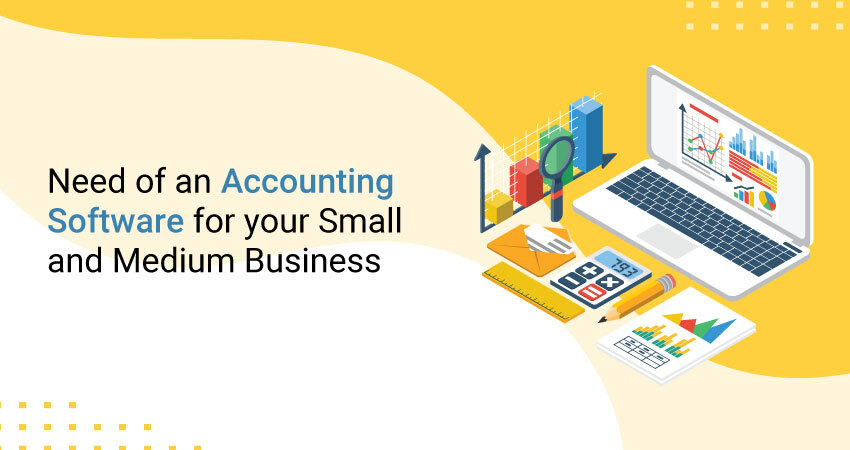Accounting software is one of the most important instruments for the sake of proper financial management of small businesses as it is a universal tool for financials. It integrates transactions, report generation and other vital tasks into one tool, necessary for informed business decision-making. Accounting software adds features like automated invoicing and employee payroll processing and the fact that it provides real-time financial tracking reduces the need for the manual entry of data and this, in turn, minimises errors and saves a lot of valuable time. Moreover, it provides scalability to match the company’s growth plan, enabling the addition of additional features or modules always as required. Overall by joining all financial aspects in one processing system small businesses will not only be able to keep the records straight but also ensure compliance with the tax regulations and to become financially healthier and more stable.
In this article, we will discuss reasons why accounting software is an essential technology for your small business. Moving from streamlining the sales process to the investment in profitability, this software will be a breakthrough for your business. The advantages like the ones that are to be talked about shortly will be on hand to make your business climb to new heights.
Efficiency and Time Savings
Automation and Time Saving The software that is accounting-related automates a lot of the boring tasks that take a lot of time when managing financial information in a small business. Such tasks cover, for example, automatic bill payments, bank reconciliation, as well as payroll calculations. This will in turn allow them to free up their time to engage in more strategic and developmental activities.
In the course of work automation, accounting software provides a range of other benefits that vastly improve any business’s performance. It is the centralised recording service for financial transactions and is also user-friendly in the monitoring of budget and fund flow statements. The data input and reporting system has given entrepreneurs the ability to easily and quickly make better decisions thereby avoiding the sluggishness caused by the usual accounting procedures.
Furthermore, accounting software often includes features such as:
- Data Availability: Access to financial data anytime, anywhere, which is particularly useful for on-the-go decision-making.
- Minimal Errors: Automated calculations reduce the risk of human error, ensuring greater accuracy in financial records.
- Scalability: As the business grows, the software can adapt, integrating additional features or modules to meet the expanding needs.
- Insightful Reporting: Generate detailed reports that provide insights into business performance, helping to identify trends and opportunities for improvement.
By leveraging these advantages, small business owners can not only save time but also gain a clearer understanding of their financial position, leading to better strategic planning and a stronger foundation for growth. Accounting software thus becomes an indispensable tool for managing a business’s financial health and driving its success.
Accuracy and Error Reduction
Precision and Error Mitigation Human mistake is a common occurrence in manual accounting and can result in large financial disparities. Accounting software reduces these errors by offering precise computations and error-checking for typical blunders. This guarantees the accuracy and dependability of financial records and statements. Indeed, the accuracy and consistency of financial data are essential to any firm.
The ease and accuracy of accounting procedures that used to be done manually are significantly increased than by the use of accounting software. The accounting program would make use of the automation of complex computations and give uniform accounting rules such that the program ensures that all financial transactions take place and are documented appealingly. This, therefore, increases the reported periodical financial statements’ quality and gives the business owners comfort in the fact that their accounting records are not confusing and free from errors.
Moreover, accounting software often incorporates advanced features such as:
- Real-time Error Detection: Immediate alerts for any discrepancies or anomalies in financial data.
- Audit Trails: Comprehensive logs that record every transaction and modification, providing transparency and facilitating audits.
- Reconciliation Tools: Simplified reconciliation with bank statements, reducing the likelihood of unmatched or missing entries.
- User Permissions: Control over who can access and edit financial information, which helps prevent unauthorized changes.
These features not only lessen the likelihood of errors but also make it easier to find and fix them when they do happen. Because of this, companies can keep accurate and current financial records, which are crucial for making strategic decisions and upholding stakeholder trust. Accounting software essentially serves as a safety net, shielding companies from the expensive fallout from financial errors.
Financial Visibility and Insights
The main advantage of using real-time data in accounting software is having a clear view of the financial performance of the business as well as deepening the financial insights. As business proprietors can now easily gain access to financial information, they can perform detailed financial analysis; understand how their operations compare against the budget and projected revenues; and highlight those areas that need improvement. Organizations developing or already incorporating such abilities will be able to respond efficiently to market changes, make insightful decisions, as well as strive for a better future.
Apart from these advantages, real-time data processing in accounting software also makes the following possible:
- Strategic Resource Allocation: By understanding the financial implications of every business decision in real time, companies can allocate resources more strategically.
- Proactive Problem-Solving: Real-time insights allow for the early detection of potential financial issues, enabling proactive measures to mitigate risks.
- Trend Analysis: Access to up-to-date financial data helps in identifying trends, which can be leveraged for competitive advantage.
- Investor Relations: Transparent and current financial data can bolster investor confidence and aid in securing investments.
Overall, the integration of real-time data into accounting software transforms the way businesses plan, analyze, and report their financial activities, leading to more informed decision-making and a robust financial management framework.
Compliance and Reporting
Accounting software plays a vital role in enabling companies to ensure the platforms of compliance and reporting are completely followed up with, which in itself is very instrumental in the process of financial management. Firms will be aware of the procedures and be safe from penalties through the program which enables them to be current with the latest financial standards and tax laws. Through exactly determining tax obligations in line with current law, it benefits the taxpayer who doesn’t have to spend time calculating how much money he needs to pay.
Additionally, accounting software can assist businesses with:
- Regulatory Updates: Keeping track of changes in financial regulations and updating the system accordingly to maintain compliance.
- Customizable Reports: Offering a range of customizable report templates to meet the specific requirements of different regulatory bodies.
- Audit Readiness: Preparing businesses for audits by maintaining detailed records and clear audit trails, which are essential for verifying the accuracy of financial statements.
- Data Security: Ensuring the security and integrity of financial data, which is critical for compliance, especially in industries subject to stringent data protection regulations.
Accounting software streamlines reporting and compliance procedures and gives companies the resources they need to keep a tight compliance posture by incorporating these capabilities. For companies of all sizes, this is priceless since it lowers the possibility of human error and frees up time for compliance-related tasks, letting owners concentrate on their main business plans.
Scalability and Growth Opportunities
Scalability also encompasses the efficiency of an organization to come up with innovations as well as market adaptability that will match the increase in demand the organization will be capable of meeting. For a business to grow lucrative, an adequate financial management system able to deal with the numerous currencies, tax regimes, and compliance standards must be created as companies often widen their product lines and new markets. Instant financial tracking can be accomplished using multiple accounting software, helping a company get a headstart over its rivals and associating the organization with quick and precise decision-making.
Scalability also entails maximizing operational effectiveness. Automating repetitive processes like payroll, reporting, and invoicing helps organizations cut down on human error and free up time for more strategic endeavours. Scalable accounting software makes this automation possible by integrating easily with other corporate systems and guaranteeing that all departments are in sync and pursuing the same goals. Fundamentally, the foundation of a scalable business model is the appropriate accounting software, which facilitates expansion by offering adaptability, effectiveness, and thorough financial control.
These five accounting software pillars help a small business succeed over the long run and grow, in addition to supporting day-to-day operations.
Conclusion:
To sum up, accounting software is the foundation of small business financial management since it provides unmatched scalability, accuracy, and efficiency. It facilitates business leaders to concentrate on expansion and strategic decision-making by automating tasks, offering real-time data, and guaranteeing compliance. Accounting software is an indispensable instrument for managing the intricacies of finance in the current competitive environment, owing to its capacity to optimize processes and adjust to changing requirements. Accepting this technology means building the groundwork for long-term growth and success in addition to streamlining daily operations. Leveraging the capability of accounting software will be crucial for staying ahead of the curve and achieving sustainable growth as small businesses continue to flourish and change.







